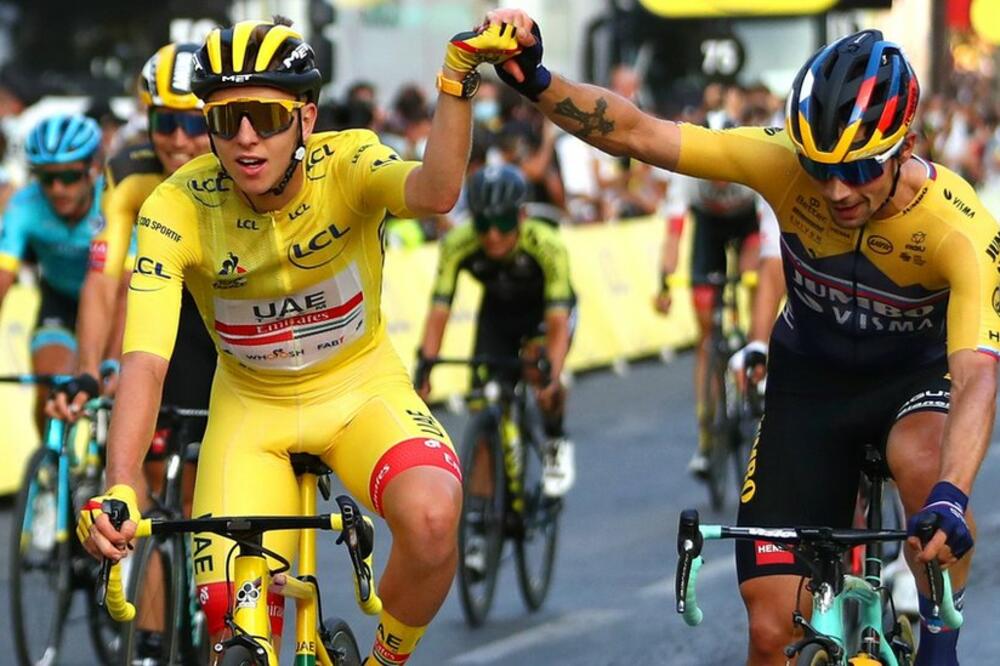Stereotypes say that Slovenians are only masters of winter sports, but while basketball player Luka Dončić dominates the NBA league, cycling fever is shaking the country - how did competitors from a country of only two million inhabitants conquer the Tour de France?
Cycling fans at the Tour de France, the most prestigious race in the world, saw one of the biggest surprises in the history of the sport.
In the center of attention were two Slovenians - Primož Roglič and Tadej Pogačar.
After a great fight, the race was won by 22-year-old Pogačar, a rookie, who became the second youngest winner of the Tour de France in history.
After winning the European Basketball Championship in 2017 and the dominance of Dončić in the NBA League, Slovenia is now again in the center of attention of the world media, and most of the headlines, like those happy families mentioned by Tolstoy, resemble each other: "Strange Pogačar", "Incredible Pogačar", "Prodigy from Slovenia"...
- "Ukr'o mami": How to keep your bike from getting legs
- Luka Dončić - a guy who breaks all boundaries
- Why the bicycle has a bright future
"The euphoria is huge, at the end of the race everyone in Slovenia was wearing yellow shirts," Boštjan Kavčnik, a Slovenian cyclist who is Pogačar's friend and his bike repairman, told the BBC in Serbian.
"We all knew he was good, but no one could have known that he was this good," adds Kavčnik, a member Kolesarski (cycling) of society Rog.
It all started there.
"You can see the euphoria at the trainings - many people call me to ask if their children can start training too," Miha Koncilija, a cycling coach, scout and the man who discovered Pogačar, told the BBC.
And how does it feel to be someone who discovered the winner of the famous Tour de France?
"Ugh," Concilius let out a first sigh and laughed.
"Very emotional. Every morning when I wake up I say to myself 'oh no, that's not possible... It's not possible that a guy two kilometers from me did it, but that's how it is.
"We have it, we are proud and we are enjoying this moment," he says with a smile.
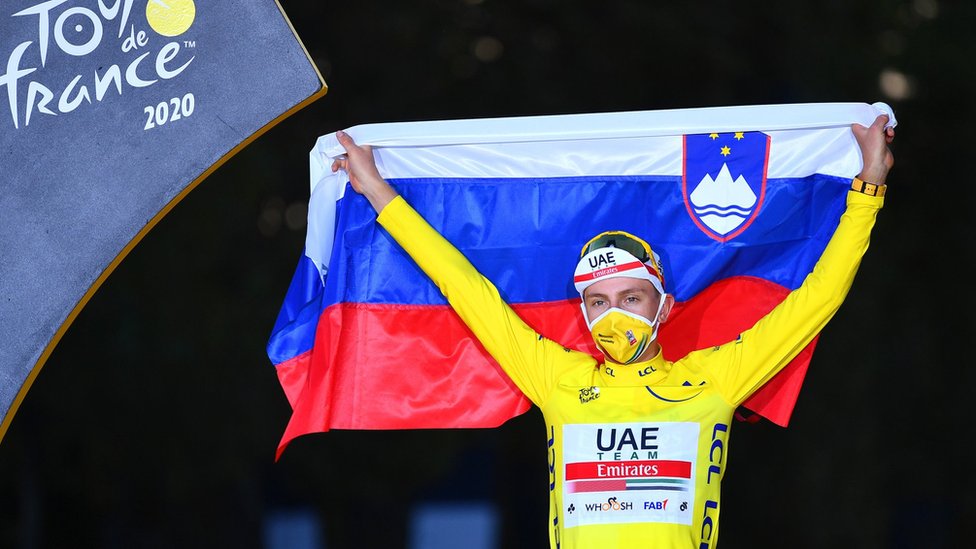
What happened?
The Tour de France was supposed to start on June 27, but it was postponed due to the corona virus.
The first of the 21 stages of the race started on August 29 in Nice, and in one month about 3.500 thousand kilometers had to be covered through France.
The yellow jersey, intended for the cyclist with the best pass in the general classification, was with Roglic for most of the race.
Roglič won the Spanish Vuelta last year - one of the three prestigious ones Grand tour races, along with the Giro d'Italia and the Tour de France - so many saw him as the favorite.
Before the penultimate stage, Roglič had a 57-second advantage over Pogačar, so it was expected that he would routinely finish the race.
- Why are Slovenians protesting on bicycles?
- How Belgrade cyclists "drove" over cars
- A kitten from Bosnia travels around the world on a bicycle
"Everyone expected Roglič not necessarily to win, but to be at the very top," Gasper Petovar, journalist of the Slovenian news magazine Reporter, told the BBC in Serbian.
"He was going for victory and all of Slovenia was with him. And everyone looked at Pogačar as, well, a young and nice guy," he adds.
For everything else except Roglic's victory, a miracle was needed - which eventually happened.
Pogačar, who drives for the United Arab Emirates team, made up for the gap, eventually gaining a total advantage of 59 seconds over Roglic.
At the end, champagne and a prize of 500.000 euros awaited him on the Champs-Élysées.
"This was one of the best performances in the history of cycling," Lance Armstrong, the famous cyclist and seven-time Tour de France champion, who lost all his titles due to a doping scandal, said on Twitter.
That was one of the single best performances we've ever seen in cycling. Absolutely unbelievable win by @tamaupogi Stage 20 on #THEMES - coming soon. @gettysport pic.twitter.com/p0rGXYteU5
- Lance Armstrong (@lancearmstrong) September 19, 2020
In the end, Pogačar was the proud owner of three t-shirts - yellow for the winner, white for the best young cyclist and polka regarding (white with red tufts) for the best on mountain routes.
He finished the race in 87 hours, 20 minutes and 5 cents.
"We got a new hero. It was really a sensation... Now all the kids want to be cyclists," says Petovar.
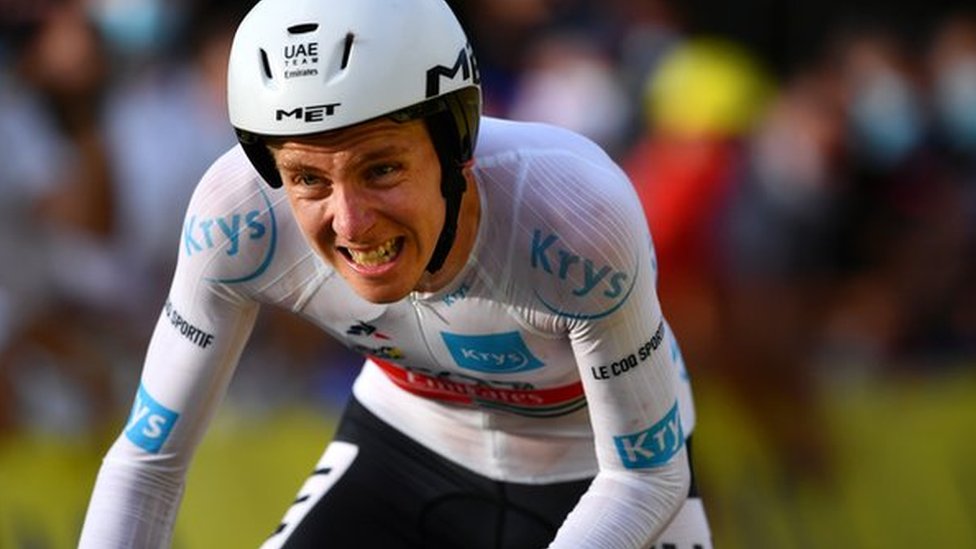
The cause of success
One Slovenian won the Tour de France, and another Slovenian was second.
What led to this and how Slovenians are so successful in one of the most difficult sports in the world, many ask.
"Many elements are needed for that to happen," Koncelija says.
"Tadej is a great talent, he has been with us since the age of nine, which means we did something right.
"When you have such a talent, the most important thing is that you don't push him too much and that he improves every year. That's how it was with Tadej".
One of the reasons is the tradition of cycling, which has existed in Slovenia since the Yugoslav period, as well as a large number of recreational clubs.
Kavčnik says that great success requires talent, but also a specific work system.
"There must be talent, you can't turn a donkey into a sports horse, but neither can that talent without proper training and the opportunity to express itself," he points out.
That's where, he says, Miha Koncilija enters the scene, who in Cycling association Rog runs the youth drive.
"He goes to schools every winter and looks for cycling talent. It's a system that has proven to be very good," says Kavčnik.
And what does that look like?
"I look for young cyclists by going to 40 different schools so I can test the kids. So, in 2007, I found Tadej's older brother Thilen, and half a year later, Tadej also started training."
Many emphasize the importance of Radoj Milić, head of the Physiology Laboratory of the Institute of Sport, at the University of Ljubljana.
- Jelko Kacin: "We are the first to reach the European Wuhan"
- Trump statue set on fire in Slovenia: "The people did their part"
- What is the secret of mass testing for the corona virus in Slovenia
German Deutsch calls Milić "the brain of Slovenian cycling".
As they state, he has been working on performance tests, developing training plans and training young coaches since 1988, and all this is just the peak of his work.
Therefore, it is perhaps not surprising that Slovenia has had a number of medal winners in cycling competitions.
Among them are Bogdan Fink, Janez Brajkovic, Simon Špilak, Andrej Hauptman, Borut Božič...
And along with Pogačar and Roglič, today there are also Matej Mohorič, Jan Polanc and Luka Mezgec - the five of them have won 2014 stages on the Grand Tours since 17.
Petovar points out that it is true that it is being done systematically, but that Slovenia has simply "never had talents like Roglič and Pogačar".
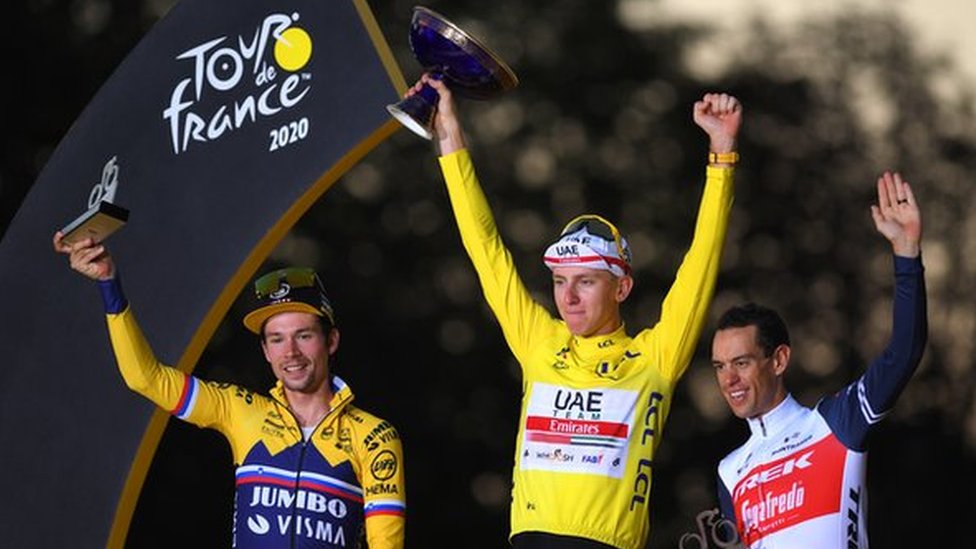
Wimbledon
Gasper Petovar
When our team won Eurobasket in 2017, everyone immediately wanted to be a basketball player. Now everyone wants to be a cyclist.
Many journalists, and I agree with that, think that this is the biggest Slovenian sports sensation in the world.
Yes, we were first in Eurobasket, but who knows about that in Asia or Latin America? Nobody.
We had an Olympic and world champion in judo, an Olympic champion in hammer throw, we were successful in ski jumping... But who knows about that.
That's why the whole world knows about the Tour de France, which this time was won by a Slovenian.
It's like winning Wimbledon.
That's why there is something about Pogačar in every newspaper every day. It all boils down to what new to find about Pogačar.
The story of Tadej Pogačar
He was born on September 21, 1998 - he turned 22 during the Tour de France.
He started training at the age of nine, and at the age of 16 he became part of the Slovenian national team.
"I've known him since he was little, since he came to us in Rog," says Kavčnik.
"At one race, Andrej Hauptman looked at what was happening and said to me, 'Oh my God, this one can't do it anymore,'" he recalls.
"And Miha Koncilija added: 'Well, he already overtook them all for the whole round'".
Kavčnik points out that one of Pogačar's advantages is that it does not lose fat easily.
"Cyclists can always see when they cover a lot of kilometers, because they lose weight. He doesn't," he states.
He has been participating in junior races since 2016, and he made his first big success in 2019 by winning the Slovenian time trial championship, along with third place at the famous Vuelta and victory in the Race through California.
Before the Tour de France, he was first in the Race around Valencia.
The Council states that in his youth Pogačar fought a great battle against kilograms, which he could never reach.
"He was always smaller than his peers and if you are 20 kilograms lighter than the others, then you have to fight a lot.
"It was the same when he was growing up, he always did his best. And when you train like that every day, it brings you a lot," he points out.
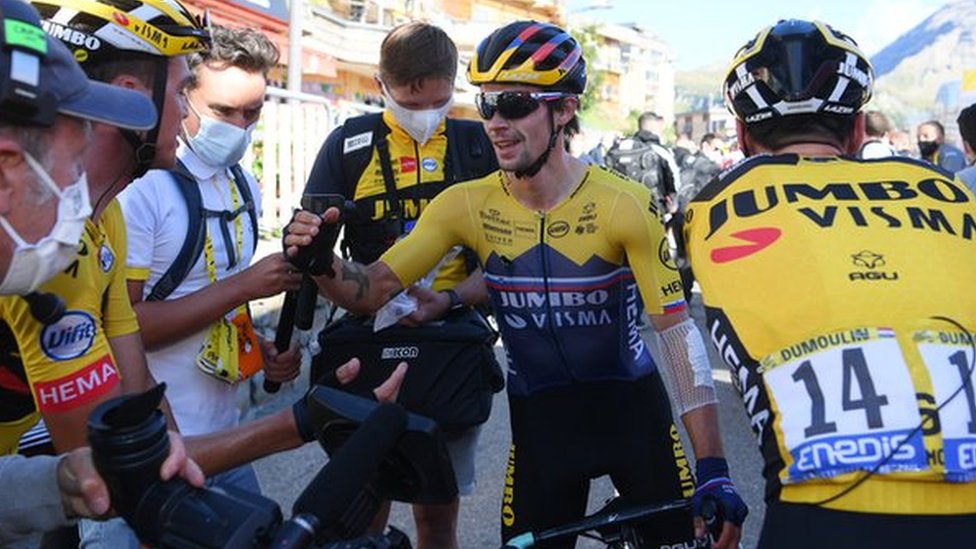
The story of Primož Roglič
He was born in 1989 and has been a professional cyclist since 2013.
He first engaged in ski jumping, which he did quite well, but in March 2007 he fell while landing in Planica.
Fortunately, he only came away with a concussion and a broken nose, and it could have been a lot worse than that.
He says it wasn't crucial to the end of his jumping career, but it had an impact.
As part of the rehabilitation program, he rode a bicycle and - the rest is history.
So far, he won the Race through Slovenia twice (2015 and 2018), in 2016 he won a stage at the Giro d'Italia, and in 2017 and 2018 he won a stage at the Tour de France.
At the World Time Trial Championship in 2017, he won a silver medal, and then came the Vuelta and the gold.
What next?
Slovenia is "infected" by cycling and it is unlikely that it will stop soon, because it is no small thing to have two of them in the world's top.
"There are two possibilities for Pogačar," says Petovar.
"One is that he really becomes the new Eddy Merckx - the famous Belgian cyclist, one of the best of all time - as some foreign journalists write, and the other is that he loses his motivation and that's it.
"But everyone who knows him says that this will not happen and that this is not all that Pogačar has shown," he adds.
According to him, Pogačar is very motivated, has the desire to be the best, always goes for victory and is prepared like no one else.
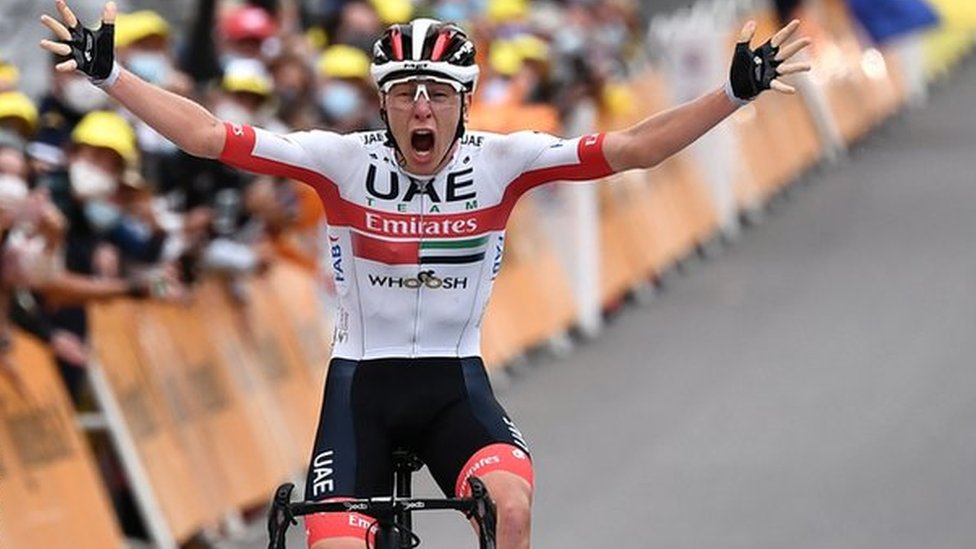
"Everyone says that it has always regenerated very quickly and well," says Petovar.
"Even as a kid, he could train all day and be as good as new in the morning. And his brother, who trained with him, would be 'half-dead' in the morning."
Kavčnik from Rog, a club that has existed for 71 years, says that the euphoria after the Tour de France is not abating and that more and more children are learning cycling.
"Many of them came last year after the Vuelta, and only now... This year, the most bikes were sold," he points out.
"We need to take advantage of that," Koncilija adds, pointing out that if there are more young people, it is more likely that someone like Pogačar and Roglic will appear again.
Kavčnik states that Pogačar is modest and that "he will only realize what he has done in some time".
"Every year he grows and I don't know where his limit is," he concludes.
Follow us on Facebook i Twitter. If you have a topic suggestion for us, please contact bbcnasrpskom@bbc.co.uk
Bonus video:



